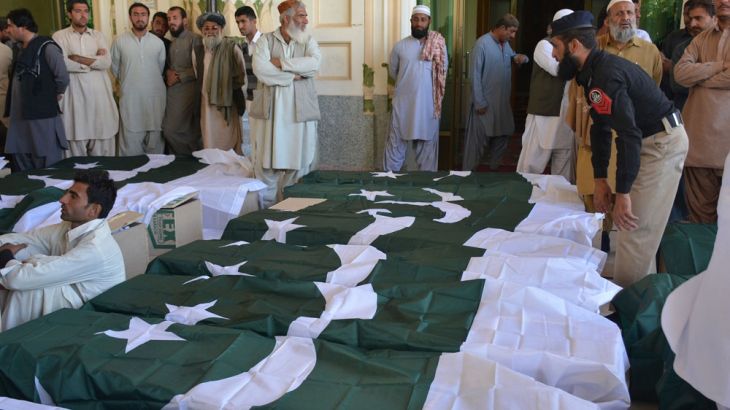Pakistan: LeJ behind police academy attack in Quetta
Pakistani general says phone intercepts show three Lashkar-e-Jhangvi attackers received instructions from Afghanistan.

Funerals have been held for those who died in the overnight assault of a police training college in Quetta that left at least 61 people dead and 170 others wounded.
Nawaz Sharif, the Pakistani prime minister, arrived in the provincial capital of Balochistan on Tuesday to pay tribute to the victims of the attack, which was claimed by the banned Lashkar-e-Jhangvi (LeJ) armed group.
Keep reading
list of 4 itemsFighters kill 60 in police academy in Pakistan
Pakistan mourns deadly hospital attack in Quetta
ISIL and Taliban claim Quetta hospital suicide bombing
Al Jazeera’s Osama Bin Javaid, reporting from Quetta, said survivors recalled hiding under their beds and jumping off windows to escape the attack.
READ MORE: Why is Pakistan’s Balochistan an easy target?
“We heard harrowing tales of how the trainees escaped when multiple attackers scaled the wall, came into the academy, and lobbed grenades into the various barracks where these trainees were sleeping, and then two of them set off their suicide jackets,” he said.
He said an offshoot of LeJ called the Al Alami group has claimed responsibility for the attack, and has specifically targeted the training college because “it was a soft target”.
“This is a group that has been involved in sectarian attacks in the city of Quetta. It’s considered to be very strong here,” he said.
General Sher Afgun, a senior military commander in Balochistan, confirmed the report, saying calls were intercepted between the attackers and their handlers, suggesting they were from the Al Alami wing of LeJ, a sectarian Sunni armed group.
“We came to know from the communication intercepts that there were three militants who were getting instructions from Afghanistan,” Afgun said.
![A police cadet, who was injured in the attack, lies in a hospital in Quetta on Tuesday [Reuters]](/wp-content/uploads/2016/10/00a8c61534a5497f91e25ec202ba0c46_18.jpeg)
Hundreds of trainees were stationed at the college in the city outskirts of Quetta when masked gunmen carried out the raid late on Monday, and lasted for nearly five hours.
“They just barged in and started firing point-blank. We started screaming and running around in the barracks,” one police cadet who survived told media.
LeJ, whose roots are in the heartland Punjab province, has a history of carrying out sectarian attacks in Balochistan, particularly against the minority Hazara Shias.
|
|
Pakistan has previously accused LeJ of colluding with al-Qaeda.
Authorities launched a crackdown against LeJ last year, particularly in Punjab province.
In a blow to the organisation, Malik Ishaq, the group’s leader, was killed in July 2015 with 13 members of the central leadership in what police say was a failed escape attempt.
“Two, three days ago we had intelligence reports of a possible attack in Quetta city, that is why security was beefed up in Quetta, but they struck at the police training college,” Sanaullah Zehri, chief minister of Baluchistan, told the Geo TV channel.
Monday night’s assault on the police college was the deadliest in Pakistan since a suicide bomber killed 70 people in an attack on mourners gathered at a Quetta hospital in August.
Pakistan has improved its security situation in recent years, but armed groups continue to pose a threat and stage attacks in the mainly Muslim nation of 190 million.
The Islamic State of Iraq and the Levant (ISIL, also known as ISIS), which established a self-proclaimed Muslim caliphate in parts of Iraq and Syria, has also sought to make inroads in Pakistan over the past year, hoping to exploit the country’s sectarian divisions.